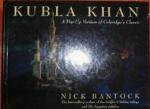|
This section contains 1,307 words (approx. 5 pages at 300 words per page) |

|
SOURCE: Bloom, Harold. “‘Kubla Khan.’” In Coleridge: The Ancient Mariner and Other Poems, A Casebook, edited by Alun R. Jones and William Tydeman, pp. 217-20. London, England: Macmillan, 1973.
In the following essay, originally published in 1961, Bloom views “Kubla Khan” as a work of romantic self-recognition, and of the reconciliation of opposites within the poetic imagination.
‘Kubla Khan’ is a poem of self-recognition, in which the figure of the youth as virile poet is finally identified with the poem's speaker. Behind Coleridge's poem is Collins' masterpiece of a poet's incarnation, the ‘Ode on the Poetical Character', and the dark fates of Collins himself, the young Chatterton, Smart, and the other doomed bards of sensibility. These are the rich-haired youths of Morn, Apollo sacrifices who precede Coleridge in his appearance with flashing eyes and floating hair in the last lines of ‘Kubla Khan.’ In Blake's myth such a youth is...
|
This section contains 1,307 words (approx. 5 pages at 300 words per page) |

|


